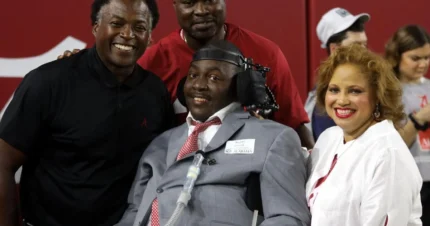Until players are compensated, expect more schools to spend millions spoiling their student-athletes.
If you can’t pay them, spoil them.
It’s a recent trend that’s taking place in collegiate sports, as LSU has become the latest big-time athletic department to find the loophole that keeps “student-athletes” taken care of without them being legally paid.
On Sunday, LSU released videos and pictures of their new football locker room that’s estimated to have racked up $28 million in renovation costs. The state-of-the-art facilities include chairs that fold out into sleeping pods that are equipped with charging ports. And the reaction to LSU’s new facilities caused many to ask a very necessary question.
“If you can spend money on this, then why can’t you just pay the players?”
Former LSU, and current Carolina Panther, safety Eric Reid was wondering the same thing.
“The locker room when I was at LSU 7 years ago was better than the current one in Carolina. But there’s no money to compensate these young men for the revenue they bring to the school #JustSaying,” he wrote.
But here’s the thing, I believe that universities have figured out the cheat code. They understand that while this discussion about player compensation is being amplified like never before, there is still a chance that even if a system is put in place to play players, it still wouldn’t compare to the revenue that some football and basketball programs bring in for their respective universities.
As I said before. If you can’t pay them, then spoil them.
Because while many believe that we’re getting close to living a world in which student-athletes may be able to earn money off of their likeness, let’s not forget that the NCAA is doing everything they can to slow that momentum down, despite what they say in public.
Last month, the NCAA threatened to ban schools in California from participating in championships if a state bill isn’t dropped that would allow student-athletes to make money off their name, image, or likeness starting in 2023. The bill has already easily passed in the state Senate. However, the NCAA is threatening to stop 23 NCAA Division I schools, including four from the Pac-12, from playing for championships based on what state elected politicians have the right to do in California.
The NCAA wants things to be put on hold as they work through ideas on player compensation. The nonprofit organization that generates over a billion dollars in revenue wants to come out looking like the good guy in this, while lawmakers in California are just trying to do something that the NCAA should have done decades ago.
So until this can get sorted out, LSU is just going to do everything they legally can by spoiling the athletic program that brings in the most revenue for the university. It’s a move that other schools have successfully done before.
Last year it was announced that Alabama was going to upgrade their athletic facilities with a 10-year initiative that would total $600 million. According to AL.com, in the past, Alabama Football has brought in a profit of close to $50 million in a single season, and close to $110 in total revenue.
Back in 2013, $68 million was spent on Oregon’s football facilities. And at Michigan, Jim Harbaugh has taken his entire team on international offseason trips to places like South Africa, Italy, and France.
And on the basketball side, just Google the basketball facilities at Duke, or read up on the luxury dorms that were built just for the players at Kentucky that include a private chef.
Some people will look at things like this and say it’s unfair that the student-athletes are getting special privileges. And to that, I will say that this is simply how universities are finding smart and legal ways to deal with the hands they’ve been dealt by the NCAA.
Besides, it’s not like student-athletes have the time to find regular jobs like other students on campus. And it’s not like regular students are bringing in millions of dollars every fall and winter.
So until the archaic NCAA speeds up the process of putting money in student-athletes pockets, this trend of lavish spending will continue.
Because if you can’t pay someone who is working for free, you might as well take care of them like never before.



